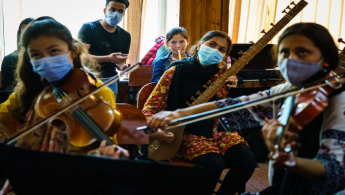Afghan musicians look to recreate famed school in Portugal
Former students and faculty members from the Afghanistan National Institute of Music arrived with their families Monday in Portugal, where they are being granted asylum and where they hope to rebuild their acclaimed school.
The 273-person group, including some 150 students, flew into Lisbon, the Portuguese capital, from Doha, Qatar. Their departure from Afghanistan was staggered in five airlifts to Doha over six weeks in October and November.
"The arrival of the (institute's) community today means that the first and most important step of saving lives and insuring freedom is now over," the institute’s founder and director, Dr. Ahmad Sarmast, said in a written statement.
Governments and corporate and private donors met the group’s evacuation and resettlement expenses.
"From now on, (the institute’s) musicians will be a symbol of courage and resolve, not only for Afghan artists, but also for the people of Afghanistan, in their struggle against the oppression and tyranny of the Taliban," Sarmast said.
The musicians are among tens of thousands of Afghans, including many from the country’s sports and arts community, who have fled since Taliban fighters seized Afghanistan in August, when the U.S. and NATO ended their 20-year military presence.
The Afghanistan girls’ youth soccer team has also resettled in Portugal.
Afghanistan has a strong musical tradition, and a pop music scene had flourished there over the past two decades. But many musicians fear for their futures under the Taliban, which rules according to a harsh interpretation of Islamic law.
The Afghanistan National Institute of Music, founded in 2010, was renowned for its inclusiveness. It became a symbol of a new Afghanistan, with boys and girls studying together and performing to full houses in the United States and Europe.
The school’s campus in Kabul is now occupied by a Taliban faction. Its bank accounts were frozen and its offices ransacked, according to former school officials.
The plan is to recreate the school in Portugal, allowing the students to continue their educations, as part of a wider Lisbon-based center for Afghan culture that will welcome exiles.





 Follow the Middle East's top stories in English at The New Arab on Google News
Follow the Middle East's top stories in English at The New Arab on Google News
![The UAE is widely suspected of arming the RSF militia [Getty]](/sites/default/files/styles/image_330x185/public/2024-11/GettyImages-472529908.jpg?h=69f2b9d0&itok=Yauw3YTG)
![Netanyahu furiously denounced the ICC [Getty]](/sites/default/files/styles/image_330x185/public/2024-11/GettyImages-2169352575.jpg?h=199d8c1f&itok=-vRiruf5)
![Both Hamas and the Palestinian Authority welcomed the ICC arrest warrants [Getty]](/sites/default/files/styles/image_330x185/public/2024-11/GettyImages-2178351173.jpg?h=199d8c1f&itok=TV858iVg)